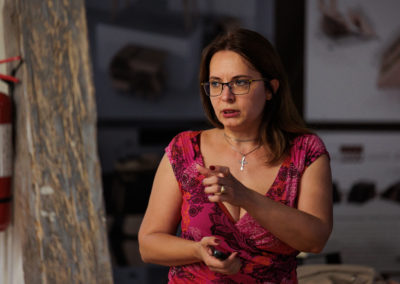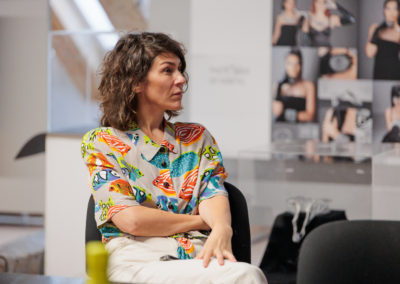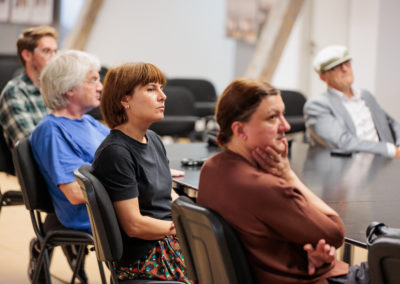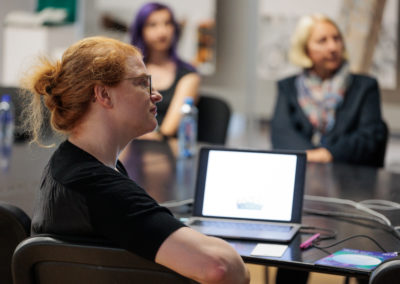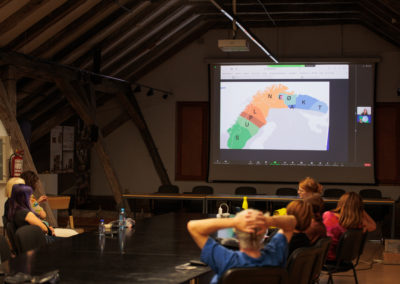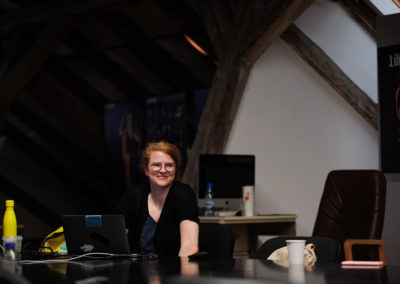
Public lectures by Meda Andrei & Katrin Losleben
𝐌𝐞𝐝𝐚 𝐃𝐚𝐧𝐢𝐞𝐥𝐚 𝐀𝐧𝐝𝐫𝐞𝐢 is a meteorologist with a remarkable career in both meteorology and physical sciences. She has 23 years of experience in the field studying the development of complex meteorological phenomena which affect everyday life, working mostly at the National Meteorological Administration in Bucharest. She received her PhD in physics on “Research on the dynamical and thermodynamic processes that determine the occurrence of severe weather phenomena”, raising awareness of the powerful effects of weather phenomena. In her view, climate change is an “invisible enemy of our time”, which demands from us more actions and engagement to deal with the consequences.
𝐊𝐚𝐭𝐫𝐢𝐧 𝐋𝐨𝐬𝐥𝐞𝐛𝐞𝐧 is trained as a musicology, literature and media scholar. She received her phD at the University for Music and Dance Cologne, before joining the Arctic University of Norway in August 2017. Her research is driven by the wish to analyze power relations in the narratives that infuse societies both in history, present and for future times. Being a feminist scholar, she has broadened her focus from analyzing the existing stories about one specific historic actor (phD) and re-narrating it, to scrutinizing dominant tropes in popular Western culture. Her aim is to help to unpack the potential of the humanities to contribute to a better understanding of the cultural aspects of the current environmental crisis. With her actual research, I wish to move beyond persistent Western narratives on environment and climate change, to understand how places can be understood also through embodied knowledges, and what impact this could have on the living and dying of humans and other than humans. Her research draws from feminist and critical theories, and examines knowledges, places and relations. Wondering what knowledges become perceptible and for whom and which not and for whom not, she tries to understand sensual, artistic, local and Indigenous knowledges with a geographical focus on the North of Norway/Sápmi
Listening to Weather and Landscape
27 September 2023 l Talk l Universitatea de Vest Timișoara, Faculty of Fine Arts and Design
4 Oituz Street
Asociatia Galeria Noua in partnership with Asociatia Romana de Arta Contemporana and Universitatea de Vest Timisoara are pleased to invite you to a public lecture by meteorologist Meda Andrei & feminist scientist Katrin Losleben. They will give insights into their respective research, offering an extension to the thematic scope of the exhibition project ”Blue Sun. Conversations on Art, Science & Ecology.

About Meda Andrei’s public lecture
Severe and extreme weather events, which are increasing in frequency and intensity through: melting glaciers, increasingly warm winters, hot summers, longer droughts and hard-to-control forest fires, are the undeniable result of climate change. Climate change, our ‘invisible enemy’ until now, is becoming more visible and directly affecting our lives.
Among the causes contributing to climate change are: burning fossil fuels, agriculture, transport and deforestation. The massive consequences of these activities are being felt in the atmosphere through the ‘greenhouse effect’, which has been present since the industrial age (last 150 years), with temperatures rising faster than at any other time, with estimates of +4°C higher. In the last 10,000 years there has been a temperature rise of 5°C, which today can happen in just a few tens or hundreds of years. At the same time, an extreme temperature phenomenon that in pre-industrial times was observed once every 10 years is now observed about 3 times every 10 years (extreme precipitation – the amount of water has increased by 6.7%). Compared to the Romanian area, hailfalls are increasing. These are just a few of the phenomena that have changed in recent decades and that affect us directly.
In this respect, climate drivers contributing to these phenomena include: fossil fuel burning, agriculture, transport and deforestation. The massive consequences of these activities are felt in the atmosphere through the ‘greenhouse effect’, which has been present since the industrial age (the last 150 years), with temperatures rising faster than at any other time, with estimates of +4°C higher. In the last 10,000 years there has been a temperature rise of 5°C, which today can happen in just a few tens or hundreds of years. At the same time, an extreme temperature phenomenon that in pre-industrial times was observed once every 10 years is now observed about 3 times every 10 years (extreme precipitation – the amount of water has increased by 6.7%). Compared to the Romanian area, hailfalls are increasing. These are just a few of the phenomena that have changed in recent decades and that affect us directly. According to the World Meteorological Organization (WMO), the level of carbon dioxide (CO2) in the atmosphere continues to rise alarmingly, with a record high in 2019 of almost 150% higher than in 1750. Climate change poses a threat to food security, health and availability and may lead to more people having to flee affected areas, thus generating an increase in the number of climate refugees.
It is essential that people are aware of the seriousness of the impact of rising global average temperatures and take action to reduce the effects of climate change and help us adapt to it.
About Katrin Losleben’s public lecture
How we deal with environmental crises is not about how we understand how to be human on this planet. It’s about what we know about other earthlings and our relationships with them. Reliance on science and scientific ‘solutions’, closely linked to capitalist, colonialist and imperialist extractivism, has created endless catastrophes in the lives of others (colonised, racist, non-Western, ‘nature’) and has culminated in recent centuries in ecological collapse, tangible in all corners of the planet. Through the Arctic Auditories – Hydrospheres in the High North project, funded by the Norwegian Research Council 2021-25, researchers from five fields are brought together to materialize what listening to human and non-human voices can mean, to imagine alternative conceptualizations and performances of knowledge and consequently sustainability.
A cultural anthropologist of music, a human geographer, a landscape and sound researcher, a feminist musicologist and a literary scholar have taken a lean theory approach (Kosofsky Sedgwick) to listening to the waters of northern Norway. From this example, citing those of Astrida Neimanis, Susan Bickford, AM Kanngieser and Zoe Todd, we can extend the notion of listening to political interactions with non-human beings.
The project is firmly grounded in feminist and queer theory, taking into account the troubled history of listening from a gendered perspective, but moving on to new feminist materialist understandings of trans-corporeality and issues of sound and fluidity.
However, key perspectives come from local communities in and around Tromsø, some of them indigenous. We learn from those whose ancestors have lived in Tromsø for thousands of years, from those who have come here in recent weeks, and from those who come here temporarily. What they all have in common is also triggered by our project, they become more aware of how they understand the area through its sounds, how they are part of the soundscape, how they hear the place differently over time or in comparison to areas they have lived in previously, and how others might hear the same sounds but read them differently. We wonder: What happens when these floating experiences of a place meet? How does listening to the waters disturb common Western epistemologies? What sound knowledge exists that has not been listened to? And how can we enter on this basis into discussions about how to live and make this place in a meaningful way?
The ”Blue Sun” project is included in the extended programme of Timisoara 2023 – European Capital of Culture.
The project “Blue Sun – Conversation on art, science, and ecology” benefits from a 93960 Euro grant from Iceland, Liechtenstein and Norway through the EEA and Norway Grants.
The EEA and Norway Grants represent the contribution of Iceland, Liechtenstein and Norway towards a green, competitive and inclusive Europe. There are two overall objectives: reduction of economic and social disparities in Europe, and to
strengthen bilateral relations between the donor countries and 15 EU countries in Central and Southern Europe and the Baltics. The three donor countries cooperate closely with the EU through the Agreement on the European Economic Area (EEA). The donors have provided €3.3 billion through consecutive grant schemes between 1994 and 2014. For the period 2014-2021, the EEA and Norway Grants amount to €2.8 billion. More details are available on: www.eeagrants.org and www.eeagrants.ro




